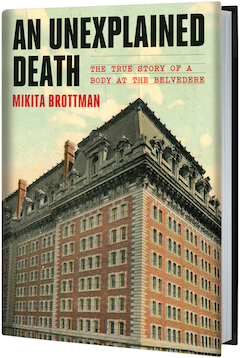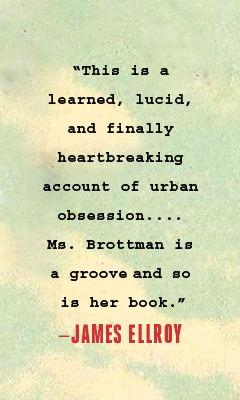An Unexplained Death: The True Story of a Body at the Belvedere
by Mikita Brottman
Some might accuse author and professor Mikita Brottman (The Great Grisby) of being obsessed with death. But, she explains, "If my pursuits appear unhealthy to the modern eye, that is simply because they are no longer fashionable. Mine is the unhealthiness of the modern-day ascetic, the anchorite, the mortifier of the flesh. These moments I seek are my mementi mori, ritual injunctions reminding me that my own death is a little closer every day." This fascination with fatalities is what ignited a decade-long investigation into the death of Rey Rivera. A young man in the prime of his life, Rivera died under mysterious circumstances at Brottman's apartment building, the Belvedere, in Baltimore, Md. An Unexpected Death details the amateur sleuth's search into Rivera's life and death, while also delving into the psychology of suicide and the Belvedere's history of people taking their own lives.
Brottman is taking her dog for a walk when she first notices Rey Rivera's "Missing" poster. Instead of merely glancing at it, she carefully studies the paper tacked to a nearby utility pole and concludes, "I've rarely seen a 'Missing' poster for an unappealing or angry-looking person.... To grab your attention, missing people have to possess a certain allure. They have to mesmerize you." In his poster, Rivera does just that. To Brottman he looks "like an old-fashioned movie idol." Eight days after Rivera goes missing, the body of the mesmerizing man from the "Missing" poster is discovered in Brottman's building, a former grand hotel turned into apartments. The investigators have unanswered questions and though they are unable to prove so conclusively, the general consensus is death by suicide. Rivera did not live in the Belvedere or frequent it, yet police detectives recover his decomposing corpse from an area where even residents are restricted. A young newlywed, Rivera didn't show signs of depression and had both personal and professional plans in the works when he died. According to Brottman, "those who knew Rivera say the idea of suicide makes no sense at all." The unanswered questions nag at Brottman and she decides to investigate the death herself. She explains, "Like almost everyone else caught up in the case, I feel there has to be something more sinister going on.... I do not believe that I will solve the mystery of Rey Rivera's death; nonetheless, I cannot help wanting to go deeper."
As Brottman digs into Rivera's life and the circumstances of his death, more mysteries emerge: a cryptic missive some theorize is a suicide note, the strange behavior of his co-workers, veiled warnings to Brottman concerning her safety. Rivera's unfortunate demise has all the makings of a modern-day suspense novel.
An Unexplained Death has a vital element that most fiction books don't, however--bureaucracy. Fictional sleuths find perfect contacts in their address books and gain access to all the documents and information they need. Brottman is not so fortunate. "I am awkward and self-conscious, aware of my inexperience and lack of credentials. I am a literature professor and a writer, not an investigative reporter, definitely not a journalist. I have no connections, no clout, no names to drop." Brottman ping-pongs between government offices trying to obtain a police report. She waits six months after filing a Freedom of Information Act request for FBI reports, only to be granted just two pages from a large file--pages she had already accessed from the Securities and Exchanges Commission's website. She's not even allowed to know if Rivera's case is open or closed.
Fans of true crime--and those who enjoy the fictional variety--will find plenty to rivet them in An Unexplained Death. But the story also offers a lot to those who relish the psychological mysteries of mankind. Brottman looks closely at suicide, through published studies and research as well as anecdotal examples directly tied to the historic Belvedere building. Her findings are fascinating and insightful, and they add to the intrigue of Rivera's case, contrasting the figure his friends and family describe him to be.
The richest gem of An Unexplained Death, however, is Brottman herself. She opens her life to her readers as she journeys through this investigation--its highs and lows, frustrations and rewards. Brottman is candid and honest, sharing her reactions alongside evidence she recovers, personal experiences with research she conducts. Her description of the ghastly desk she uses in a family burial plot is telling, as is her choice to take home an old forgotten cardboard sign reading, "Sorry, the Reptile House Is Closed," and hang it in her bathroom.
Intriguing, mysterious and tragic, this beautiful tribute to the secrets of death from a true "connoisseur" of the subject is macabre poetry that sings. --Jen Forbus









